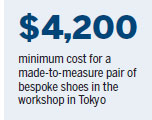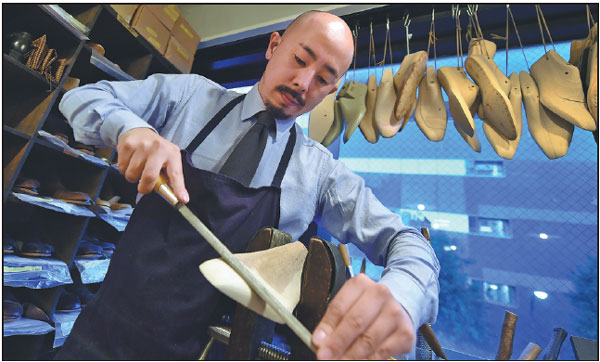Japan shoemakers make strides
China Daily | Updated: 2017-11-23 07:41
| Japanese master shoemaker Yohei Fukuda creates shoes in his workshop in Tokyo. Each pair takes between 120 and 140 hours. Kazuhiro Nogi / Agence Francepresse |
TOKYO - When Yohei Fukuda left for England more than a decade ago to learn his trade as a master leather shoemaker, he could hardly have imagined that his native Japan would one day become a leader in this traditionally European art.
"The number of bespoke shoe workshops has been booming in Japan in the past few years," said the elegant-looking bald and mustachioed 37-year-old, sporting a smart shirt and tie under a dark-blue work apron.
"There are at least 40 in Tokyo today and maybe as many as 100 in the whole country," Fukuda said.
Bespoke leather shoemaking has historically been dominated by European artisans, but Japan developed a taste for the luxury footwear at the beginning of the 2000s and local manufacturing classes quickly took off.
Fukuda's own workshop is located close to the upmarket area of Ometesando in Tokyo, often described as Japan's answer to the grand Champs Elysee avenue in Paris.

There is not one machine in the whole place - everything is done by hand, from the precise measurement of a client's feet to the delicate business of attaching the soles to the shoe.
"Each pair of shoes takes between 120 and 140 hours of work and we produce around 80 a year," explained Fukuda. He does not want to go at a faster pace. "I want to make good shoes," he said.
Fortunately, his customers are in no hurry and willing to pay a hefty price for the bespoke quality - a made-to-measure pair costs 480,000 yen ($4,200) at least.
'Japanese spirit'
Why Japan? Mari Yamaguchi, who teaches this meticulous trade in a private school in Tokyo said that bespoke shoes "speak to the Japanese spirit, with its sense of detail".
At Yamaguchi's school, dozens of young students are bent over workbenches, carefully learning each one of the painstaking steps required in the manufacturing process.
"A foot is something very special. Each foot is unique, like each piece of leather. When making bespoke shoes by hand, the challenge is to get close to perfection by bringing together these two imperfect but magic elements," she said.
The Japanese have developed such a good reputation in the field that Western apprentices are now heading east to learn the trade.
In Fukuda's workshop, five apprentices labor on workbenches made from old 1920s English chests of drawers.
One scrutinizes the quality of a new delivery of leather, another sews on a sole, making sweeping gestures with his arm every time he pulls the thread.
And these interns are in turn bringing their own Japanese-inspired creativity to the ancient tradition.
Clemence Rochard, a 27-year-old French apprentice, created a pair of handmade shoes made partly of leather and partly from material from a sparkling, flowery kimono she found in Kyoto.
"In Japan nobody would have thought about it," Fukuda said.
Agence France-presse

























